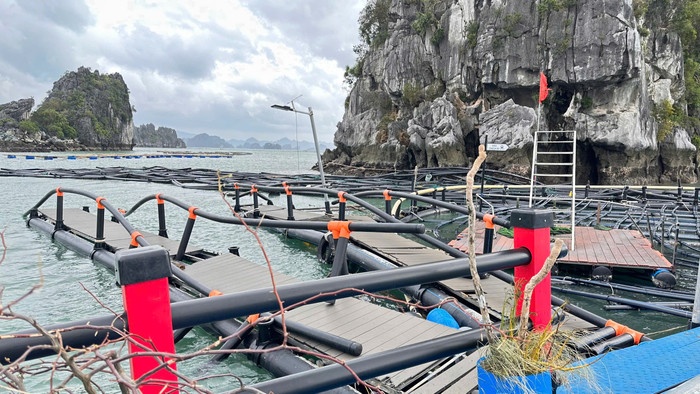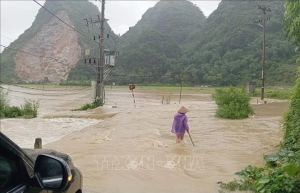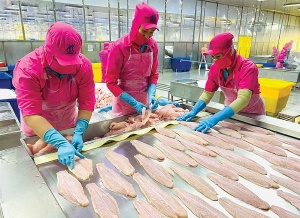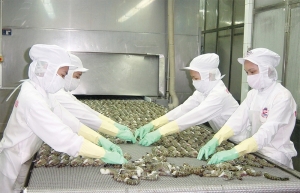Climate change and natural disasters threaten aquaculture industry
According to vtv.vn, Le Thanh Luu, director of the International Collaboration Centre for Aquaculture and Fisheries Sustainability, stated that climate change is severely impacting the aquaculture sector.
He noted that global temperatures have risen by approximately 1.5 degrees Celsius compared to previous averages, affecting water quality and aquatic product yields.
According to the Ministry of Agriculture and Rural Development (MARD), typhoon Yagi caused extensive damage to the agricultural sector. In the northern cities and provinces of Quang Ninh, Haiphong, and Hai Duong, over 1,500 aquaculture cages were damaged or swept away. Quang Ninh province alone saw more than 1,000 aquaculture cages in coastal areas destroyed or washed away, with individual fishermen suffering losses ranging from hundreds of millions to billions of VND.
 |
| Aquaculture cages suffered extensive damage |
At the MARD's briefing on agricultural recovery measures following typhoon Yagi, Tran Dinh Luan, director of the MARD's Fisheries Department, reported significant damage to marine aquaculture areas, with sea cages destroyed or swept away, causing severe losses to fishing communities.
Extensive power outages in Haiphong and Quang Ninh caused by the severe storm have significantly impacted shrimp and oyster farming operations.
Beyond natural disasters, the industry faces considerable pressure from rising feed prices. Since the beginning of the year, aquaculture feed prices have increased from $1.3 to $1.45 per kg, substantially raising production costs. This directly affects farmers' profits and complicates efforts to maintain stable production.
To date, the aquaculture sector has achieved export revenue of approximately $6.25 billion out of the $9.5 billion target set for 2024. However, the damage and disruption caused by Typhoon Yagi are now challenging the industry's ability to meet the goal.
Currently, authorities and the Vietnam Fisheries Society (VINAFIS) are working to support northern provinces in minimising losses and restoring production. The sector is also intensifying supply-demand connectivity efforts, facilitating businesses' access to target customers, and enhancing brand recognition to increase the value of Vietnamese seafood products.
The International Aquaculture Vietnam 2024 Exhibition, scheduled from October 9-11 in Ho Chi Minh City, will feature 100 businesses and attract 4,000 visitors from over 20 countries and territories. This event presents a valuable opportunity for Vietnamese aquaculture enterprises to explore new markets, technologies, and trends.
VINAFIS has also cautioned southern provinces about complex weather forecasts, urging them to develop plans to ensure production and exports.
Luu emphasised the necessity of applying technology and digital transformation in aquaculture production to enhance efficiency and mitigate the negative impacts of climate change.
“Utilising renewable energy sources like solar and wind power, along with transitioning to low-carbon emission feeds such as algae or insect-based proteins, are effective measures to reduce greenhouse gas emissions. Additionally, developing aquatic species more adaptable to changing environments will be crucial for sustainable development,” he said.
The Vietnam Association of Seafood Exporters and Producers reported that in August, seafood exports continued to recover with 20 per cent growth, reaching nearly $953 million. In the first eight months of the year, seafood exports totalled almost $6.3 billion, an increase of nearly 9 per cent compared to the same period last year.
 | PM urges proactive moves in response to heavy losses in natural disasters Prime Minister Pham Minh Chinh issued an official dispatch on August 4, demanding proactive moves to prevent, control, and address natural disaster consequences in the coming time. |
 | Aquaculture stocks lean to speculative Market experts suggest that investors could consider speculating on leading Vietnamese aquaculture stocks in the final two quarters of the year, as valuations become increasingly attractive due to the cyclical nature of the sector. |
 | Aquaculture groups wrap up funding More local and foreign companies are making new investments in sustainable aquaculture farming. |
What the stars mean:
★ Poor ★ ★ Promising ★★★ Good ★★★★ Very good ★★★★★ Exceptional
Related Contents
Latest News
More News
- PM outlines new tasks for healthcare sector (February 25, 2026 | 16:00)
- Ho Chi Minh City launches plan for innovation and digital transformation (February 25, 2026 | 09:00)
- Vietnam sets ambitious dairy growth targets (February 24, 2026 | 18:00)
- Masan Consumer names new deputy CEO to drive foods and beverages growth (February 23, 2026 | 20:52)
- Myriad risks ahead, but ones Vietnam can confront (February 20, 2026 | 15:02)
- Vietnam making the leap into AI and semiconductors (February 20, 2026 | 09:37)
- Funding must be activated for semiconductor success (February 20, 2026 | 09:20)
- Resilience as new benchmark for smarter infrastructure (February 19, 2026 | 20:35)
- A golden time to shine within ASEAN (February 19, 2026 | 20:22)
- Vietnam’s pivotal year for advancing sustainability (February 19, 2026 | 08:44)

 Tag:
Tag:




















 Mobile Version
Mobile Version